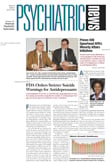Besides participating in blood pressure control and helping the body retain water, the pituitary hormone vasopressin also seems to play a role in learning, memory, and social behaviors. Evidence for such involvement goes back to the pioneering work of Dutch scientist David de Wied during the 1960s.
But which of the three known receptors for vasopressin—V1a, V1b, or V2—might mediate vasopressin’s influence on learning, memory, and social behaviors?
Isadora Bielsky, a graduate student in behavioral neuroscience at Emory University, and coworkers decided to explore this question by knocking out one of these receptors—the V1a receptor—in male mice and then comparing their learning, memory, social recognition, and anxiety behavior with that of mice with the receptor.
The mice without the receptor performed comparably to the control mice on learning and memory tests, they reported in the March Neuropsychopharmacology. However, compared with the control mice, the mice without the receptor exhibited markedly reduced anxiety behavior and a profound impairment in social recognition.
Given these findings, Bielsky and her team suggested that the V1a receptor “may provide a novel potential pharmacological target for social and affective disorders, including autism and anxiety disorders.”
This report “adds to a growing body of knowledge concerning the neural substrates of anxiety and social memory,” James Leckman, M.D., a Yale University psychiatrist and vasopressin-social behavior authority, told Psychiatric News. “In their study of mice that were genetically modified to lack the vasopressin V1a receptor, they have convincingly demonstrated that this receptor is crucial in male mice for the development of social recognition and the regulation of anxiety-like behaviors.
“While I agree with the authors that the V1a receptor may be an appropriate pharmacological target for social and anxiety disorders, further study is needed to document the impact of this deletion in female mice.”
Leckman also noted that scientists need to “develop a more complete and convincing model of how the V1a-knockout animals. . . resemble children with pervasive developmental disorders, such as autism, who show little interest in other people.”
The study was funded by the National Institutes of Health and a Yerkes Center grant.
An abstract of the study, “Profound Impairment in Social Recognition and Reduction in Anxiety-Like Behavior in Vasopressin V1a Receptor Knockout Mice,” is posted online at www.nature.com/cgi-taf/DynaPage.taf?file=/npp/journal/v29/n3/abs/1300360a.html. ▪
